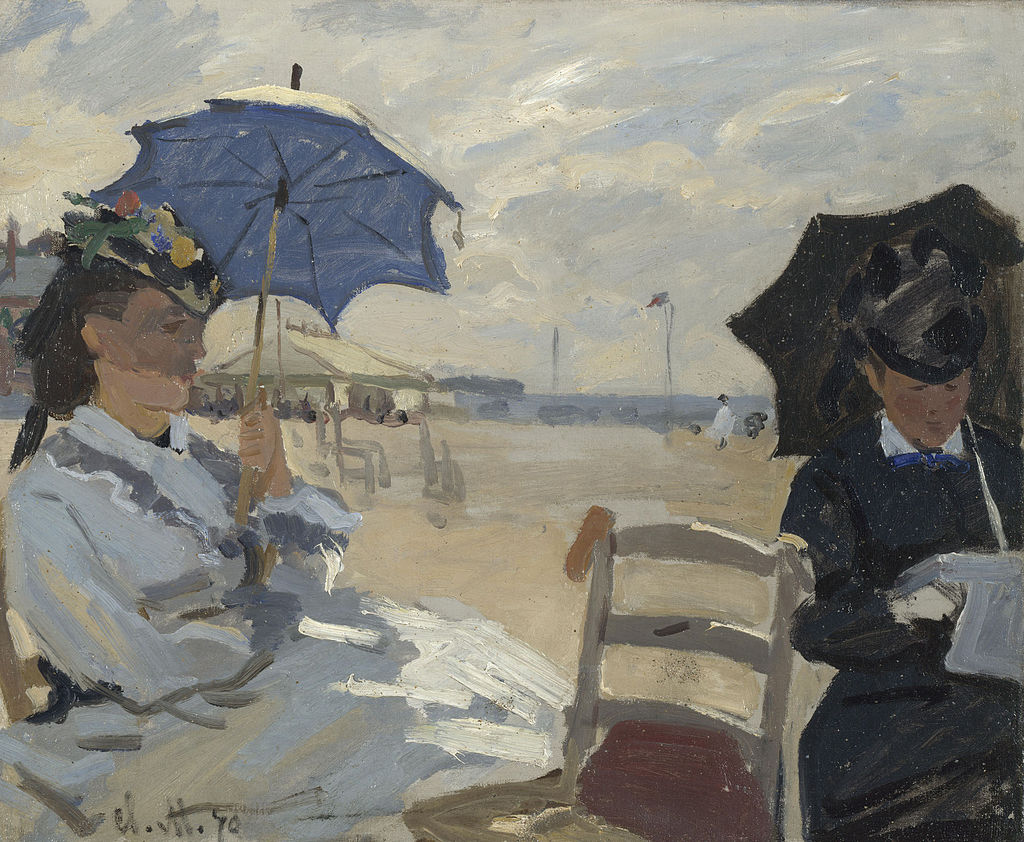
Claude Monet, The Beach at Trouville, public domain, via Wikimedia Commons.
This week, we bring you recommendations from three of our issue no. 241 poetry contributors.
This August I read three great books. In Anahid Nersessian’s Keats’s Odes: A Lover’s Discourse (about to be reprinted by Verso), red life streams again through Keats’s poems. It is a risky, passionate criticism that—in addition to yielding all sorts of insights into the man and his writing—tests what of her own life the poems might hold (and quicken). This is living in and through and with and against poetry, a brilliant and refreshingly unprofessional book. I’ve also been reading and admiring Elisa Tamarkin’s Apropos of Something: A History of Irrelevance and Relevance, a beautifully written account of the development of the concept of “relevance” in nineteenth-century Anglo American thought and art. The book says almost nothing about our own century—“the Internet,” for instance, doesn’t appear in the index—but that just makes its relevance to the present more acutely felt. Tamarkin has all sorts of insightful things to say about attention and “attentional communities,” which leads me to a final recommendation: the big strange wonderful In Search of the Third Bird, which describes itself as “the real history”—although much of it is quite fake—“of the covey of attention-artists who call themselves ‘the Birds,’ ” an actual group (or “attentional cult”) of scholars and artists who have been conducting experiments in sustained, collective attention. That James Tate line occurs to me: “Everything is relevant. I call it loving.”
—Ben Lerner, author of “The Readers”
I read selectively, so as not to flood myself, especially when I am generating my own poems, which is always. Part of me is a cold observer. The other part, an impressionable child. Either way, what I read reconfigures me, as do all things that I take in through the senses. During a recent drive to my hometown of Niles, Michigan, I was transformed by a cream-colored ox, a stone silo, and an assertive stalk of goldenrod reaching from a ditch. The poems in David Baker’s newest collection, Whale Fall, move me similarly, and deeply. It strikes me that the purpose of craftedness, of exquisite and intentional madeness, is to create a kind of eternity in a poem. Maybe such a goal, at this point in history, seems unreachable, even Romantic, in the literary sense. But let us aim for eternity anyway. “Keep walking, pilgrim,” Baker writes. “This is your great tale.” (The poem is called “Extinction.”) A collection of poems can be scattershot; it can reflect the fragmentation of our times. Or it can build something in defiance of chaos: a structure the reader can live within, while taking time to examine its architectural nuance (even as a silo burns on the horizon “with the half-life of the sun”). The craft of Whale Fall defies. It asserts, for me, a definition of poetry: an unbearable gulf of feeling made indelible by form.
—Diane Seuss, author of “Legacy”
As I say farewell to summer, I look back at a painting I saw at the National Gallery in London in June. It is Monet’s The Beach at Trouville, painted in plein air in 1870 on his honeymoon. The placard notes that sand and bits of shell are embedded in its surface, authenticating it with local grit—so different from our own time-stamped, etherized photos!
—Ange Mlinko, author of “Art Tourism”
from The Paris Review https://ift.tt/86cgh1Q
Comments
Post a Comment